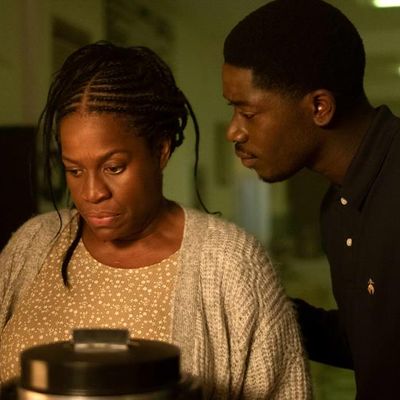
The tantalizing world of drugs, money, and violence is the obvious attraction of series about crime lords, but it’s the character development and psychological analysis of these larger-than-life gangsters that makes good television. It’s the therapy sessions in The Sopranos or the final confession of egotism from Walter White that turns a show about crime into something so much more. Snowfall has had these moments since season one as we saw Franklin grow before our eyes, transforming from a neighborhood kid into a drug kingpin. Beyond that, the political and racial themes supersede the culture of drugs and gang life, painting a holistic picture of American history from a perspective we don’t always see.
Through the lives of Franklin and his network of friends and family, Snowfall masterfully presents a world where people are born into a system that requires them to kill or be killed. To survive as a Black person in South Central Los Angeles (across the whole country, really), you only have two options: comply with a system designed to oppress you or spend your life fighting it. The psychological turmoil that comes with this predicament is especially unique to the descendants of enslaved Africans and is often exacerbated by the drastic choices people make to feel whole. While this episode wasn’t as explosive as the beginning of season six, it explores how each character is coping with the realization that no matter what, they may never truly escape this wicked system.
As Walter White claimed before his series-finale confession that his metamorphosis into Heisenberg was purely self-motivated, Franklin insists that all his actions are altruistic, stemming from a desire to uplift his family. As he tells his mother, what he’s doing could “change the fate and fortune of this bloodline for generations.” Now that he has a large target on his back, he’s frantic to get his money back and ensure his loved ones are safe. He starts with his mom, visiting her at the shelter to try to convince her to flee again to protect her from his enemies. She outright refuses; for Cissy, her solution to making herself whole within this system is to help repair the inevitable damage. Franklin doesn’t understand why she feels guilty for benefiting from the lifestyle he provided and throws in her face how he took her from being a landlord’s lackey to having the world at her fingertips. What Franklin fails to understand is that to Cissy, this life of violence and drugs isn’t better than where they started.
Tunnel vision prevents Franklin from having the nuanced and empathetic view that his mother has. Instead, he’s willing to get his money back by any means necessary. Franklin will always choose to kill instead of being killed, and the mother of his child happens to be the same, a trait she learned from her own mother. Cassandra and Veronique embark on the next phase of Franklin’s plan to get Teddy to wire the money back to his account. The three of them make a trip to Kansas City, where Teddy’s father, Jack, is living at a retirement facility. Believing that holding his dad as ransom will force Teddy to comply, Veronique and Cassandra disguise themselves as an elderly woman and her daughter to get access into the facility. Cassandra charms him into “escaping” together, and she fuels him with cigarettes, martinis, and deep conversation before Franklin and Veronique arrive.
Franklin pages Teddy, who immediately calls back when seeing the Kansas City area code. Franklin tells Teddy that he’s holding his dad hostage until he gets his money back. Teddy declares that he doesn’t give two shits about his dad, and besides, killing a CIA officer’s father will lead to nothing but trouble. Franklin, who is truly in the most unhinged and impulsive state we’ve seen him, calls Teddy’s bluff and stabs Jack in the neck right then and there, letting Teddy listen to his father’s last gasps for air. He says next he’ll go after Parissa, then his child and any motherfucker Teddy cares about. Franklin then torches the entire house with Jack’s corpse inside.
As Franklin spirals into complete desperation and destruction, Jerome has an existential crisis about his position in the drug game. First, he and Louie find out that not only did their hit on Kane fail, but part of the reason it was unsuccessful was Franklin’s involvement. Then Deon visits, aggressively requesting Leon’s loyalty after losing the fight. They have a sit-down conversation about the state of the game, with Jerome noting that people like them are a dying breed and the younger generation is far more ruthless, with loyalty to no one but themselves. Deon makes it clear that he’s not in the same category as Jerome and that it’s Jerome who is a part of the dying breed. This gets in Jerome’s head, and he leaves the club without telling Louie where he’s going.
Jerome pulls up to his friend Clyde’s car-repair shop to escape his thoughts, asking Clyde if he can help while he gets his car fixed. They drink and catch up, laughing over how many years have passed. Unlike Jerome, Clyde escaped being in the streets and settled down with his children. The dichotomy of Clyde’s life and Jerome’s life is highlighted as a car blasting music circles the shop a few times, igniting suspicion in both men. Jerome whips his gun out of his car, ready to defend himself, then Clyde asks Jerome to leave, telling him that his presence can cause trouble and that he has a family waiting for him. Jerome knows this is true and angrily leaves with the realization that his time in the streets has a high chance of ending in death now that he’s past his prime. He drinks a bottle of Crown Royal and throws his pager in the trash.
Leon and Wanda barely have time to recover from the brawl with Deon when they, too, are forced to decide what role they will play now that they’re back in L.A. Before he even has time to ice his wounds, members of Deon’s crew come to him with a proposition. Apparently Deon left with all the product and cash after the fight, so they turn to Leon as the next logical leader. They level with him, respectfully telling him that his wishy-washy presence confuses them and they want stability (even if stability to them includes gang activity). This is a fascinating moment that speaks to how well white supremacy works without a single white body needing to be present. It’s like how the overseers on many plantations were Black themselves — through decades of oppression and surveillance, Black people have been conditioned to unconsciously participate in our own enslavement. In the ’80s, Black people and gang violence were used as a conduit for the American government to maintain world dominance at the cost of their well-being, which is pretty much the premise of the whole show. Instead of trying to repair the damage Kane did to the community, to maintain the status quo and keep money flowing, Leon is sucked back into gang life and takes his place at the top of the hierarchy.
Leon’s return to leadership is yet another cautionary tale of how the drug game is like a magnet, sucking everyone it touches back in. Gustavo is desperately trying to break that cycle and finally live as a free man but is realizing how hard it is to do that. Torn between the CIA, the KGB, and the DEA (talk about stressful), he tells the truth about it all to Xiamara. He’s at the end of his rope, unable to sleep or eat. He tells her that they’ll all go into witness protection after the raid on Teddy’s warehouse. But, like Cissy, Xiamara refuses to live her life in hiding. She demands Gustavo find a way to give her the normal life she deserves, so he comes clean to Teddy. They meet over a noisy freeway, with Teddy fully ready to kill Gustavo before knowing why they’re meeting, and Gustavo confesses to speaking with Ruben and urges Teddy to move the product from the warehouse. Teddy, however, is ahead of him and has already moved the coke and lets Gustavo know that Ruben is KGB, revealing that he followed Gustavo.
Gustavo tells the DEA to call off the raid, tipping them off about the KGB’s involvement. Teddy continues to look into Ruben’s identity and breaks into his apartment. He snoops around but doesn’t find much outside of some porn magazines featuring men. Well, since it’s the ’80s, this is actually a huge development. Teddy reports back to his handler about this discovery, stating that a gay KGB agent is particularly dangerous as he’s a man with many secrets to hide. The episode concludes with Franklin’s violent murder of Teddy’s father and all the characters contemplating whether there’s even a possibility of leading a normal life one day. So, as Cassandra told Veronique, it’s imperative to prepare for the worst before hoping for the best.
Final Forecast
• Watching Wanda help out at the shelter broke my heart. I still don’t know why they even came back from Ghana; it’s not healthy for her to be in that environment. I loved Cissy’s words of encouragement, but Wanda hasn’t even been sober for a year, so it all feels a bit precarious.
• Cassandra and Veronique’s conversation at the beginning of the episode while staking out in the car is only adding to my suspicions. Cassandra is very clearly planting seeds of doubt in Veronique’s head about Franklin, calling him a “garage-sale jigsaw puzzle,” which never come with all the pieces and are “trying to make themselves whole no matter what the cost.” I mean, she isn’t lying! But Franklin needs to be careful.
• Jerome is truly unraveling before our eyes. Seeing him so defeated after leaving the shop that he threw out his pager is concerning to me, and I wonder if he’ll do something much more reckless.


